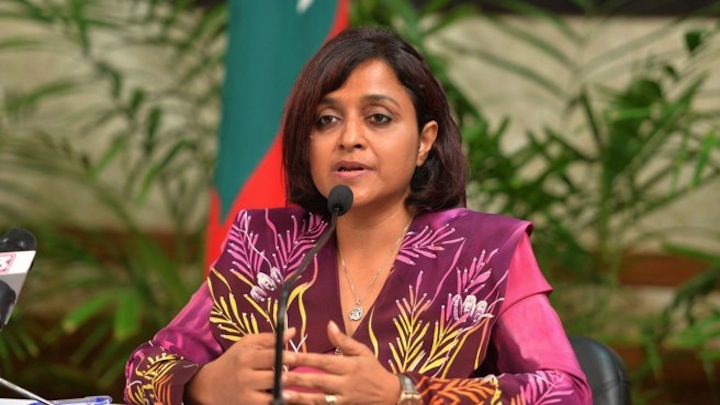Foreign minister Dunya Maumoon has expressed concern over tweets by the British High Commissioner, the European Union Ambassador and the Canadian and US missions to the Maldives regarding fresh terrorism charges against three opposition leaders.
The Adhaalath Party president Sheikh Imran Abdulla, Jumhooree Party’s deputy leader Ameen Ibrahim and its council member Sobah Rasheed are accused of inciting violence at a historic antigovernment protest on May 1 and charged with terrorism.
The UK’s new high commissioner to the Maldives, James Dauris, in a tweet on Tuesday expressed hope that judges would follow international standards and said: “Will be watching closely.”
Trial of another opposition party leader in the #Maldives starting this evening. Hope international standards met. Will be watching closely.
— James Dauris (@JamesDauris) June 2, 2015
The Canadian high commission said it was watching closely with concern. The US Embassy, meanwhile, suggested the government must take steps to restore confidence in democracy and the rule of law.
AP opposition leader charged w/ terrorism in #Maldives. Canada watching closely &w/concern. Intern’l obligations re fair trials must be met.
— Canada in Sri Lanka (@CanHCSriLanka) June 2, 2015
Concerned 3 more opposition leaders charged by #Maldives govt. Eager to see govt take steps to restore confidence in democracy + rule of law
— U.S. Embassy Colombo (@USEmbSL) June 2, 2015
Maldives: All Maldivians must get fair trials whether opposition leaders or not. Recent trials fell below fair standards & due process.
— David Daly (@DavidDalyEU) June 2, 2015
In response, Dunya tweeted today from the foreign ministry’s official twitter account saying: “I am concerned by the tweets of some countries.”
The government will not intervene in the judicial process, she said. However, she said justice will be served according to the Maldivian constitution and said “criminal activities and incitement to violence will not be condoned.”
I am concerned by the tweets of some countries. Rest assured Govt will not intervene in the judicial process -FM Dunya
— MFA-Maldives (@MDVForeign) June 3, 2015
Justice will be served as per our laws & Constitution. Criminal activities & incitement to violence will not be condoned – FM Dunya
— MFA-Maldives (@MDVForeign) June 3, 2015
Imran denied charges at a first hearing on Tuesday night. He was arrested from his home on Monday night and is to be kept in police custody until the trial concludes.
Ameen and Sobah’s hearings were cancelled last night. The two are out of the country.
If convicted, the three face between 10 and 15 years in jail.
Nearly 20,000 people took to the streets on May 1, calling for the release of imprisoned former president Mohamed Nasheed and ex-defence minister Mohamed Nazim, whose arrests sparked the ongoing political crisis.
The same three judges who sentenced Nasheed and Nazim are now overseeing Imran’s terrorism trial.
Foreign governments and international bodies, including the UN and Amnesty International, have expressed concern over the apparent lack of due process in Nasheed and Nazim’s trials. The parliament of the European Union has called for Nasheed’s immediate release.
The government, however, insists Nasheed and Nazim were granted fair trials, and condemned foreign governments for criticism of the judiciary.
The new terrorism charges follow President Abdulla Yameen’s invitation for separate talks with the three allied opposition parties, prompting concern over the government’s sincerity.
The president, however, blames lack of progress in talks on the “insincerity” of the oppoisition parties.
The MDP chairperson Ali Waheed was also arrested along with Ameen and Imran, but the PG office has reportedly not made a decision on prosecuting the former MP.
This article was amended on June 4 to include a tweet by the European Union Ambassador to the Maldives


